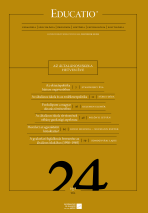A PISA hatása a neveléstudomány fejlődésére
The Impact of PISA on the Development of Educational Science
Author(s): Benő CsapóSubject(s): Social Sciences, Education, Methodology and research technology
Published by: Akadémiai Kiadó
Keywords: PISA; sampling; ranking; assessment; test theories;
Summary/Abstract: In providing a framework for interpreting the impact of PISA, this paper first outlines the main trends in the development of the social sciences, including interaction between them and the growing international cooperation. It shows how PISA embodies these tendencies, how approaches in economics, sociology and psychology appear in the program and how they are synthesized in comparative analyses to support improvements in education systems. The main part of the study reviews the effect of PISA on some major areas of educational research. It elaborates on how it has renewed the methodology for large-scale international assessments, among other things, by introducing age-based sampling, shortened time periods between assessment cycles, opportunities for improving precision by exploring one of the main assessment domains (reading, mathematics and science) in more detail in each cycle, and introducing a fourth, innovative domain. By applying a number of questionnaires on diverse themes, PISA has contributed to a better understanding of how school systems’ work and it has advanced school effectiveness research a great deal. By reinterpreting and extending the content of literacy and focusing on aspects of application, it has contributed to the emergence of a new conception of knowledge and renewed methods of framework advances. It has further developed the application of modern test theories in several respects as well as analysis and presentation technologies relating to assessment data. The last part of the paper gives an overview of criticisms surrounding the PISA process – and it outlines the spectrum of discourse, ranging from naive lay opinions to scholarly discussions among specialists from specific fields.
Journal: Educatio
- Issue Year: 24/2015
- Issue No: 2
- Page Range: 29-38
- Page Count: 10
- Language: Hungarian

